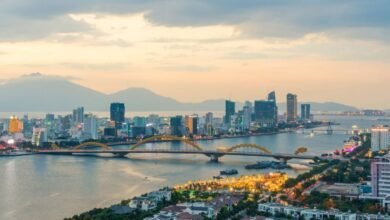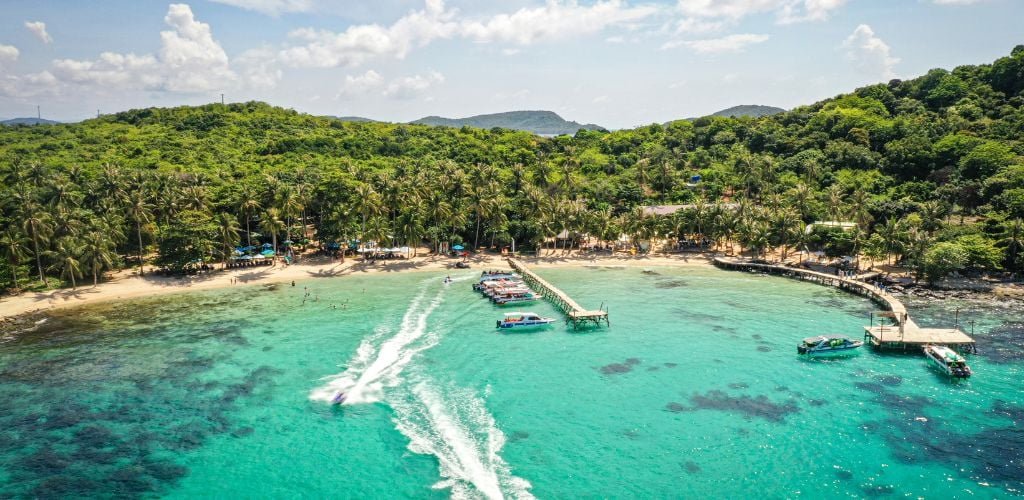
Digital Nomad Guide to Living in Phu Quoc
[ad_1]
Welcome to my digital nomad guide to living in Phu Quoc. Home to stunning beaches, spectacular national parks, and some fantastic cultural and historical sights, it’s a remote worker’s dream destination. To alleviate any confusion it’s pronounced Foo Kwuck, and it’s just one of many idyllic locations within Vietnam.
Vietnam’s largest island has everything a remote worker could desire. Whether you enjoy kicking back at the beach following a busy day at the laptop or hiking amongst stunning lush countryside between online meetings, here is why you should consider Phu Quoc as your next digital nomad location.
About Phu Quoc
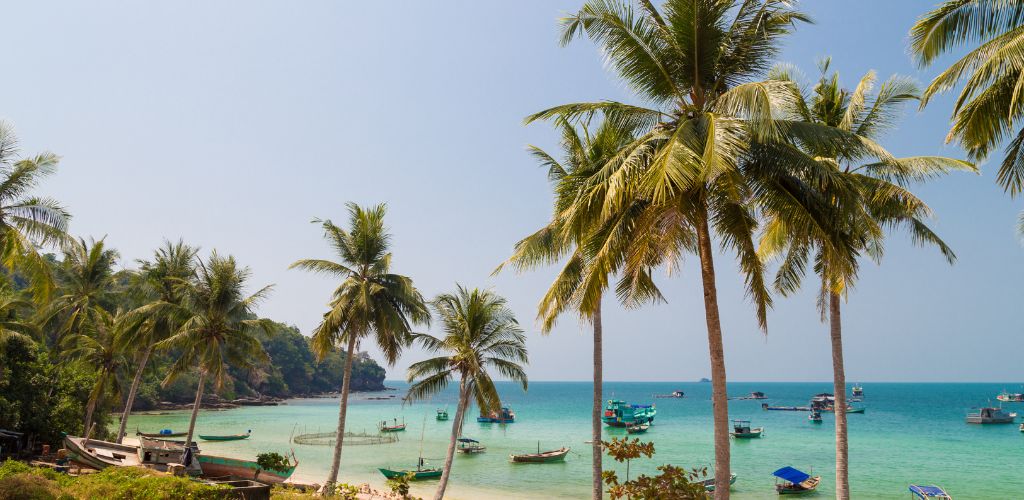
The island city of Phu Quoc is home to around 180,000 people and is currently going through a period of rapid development thanks to a tourism boom. Since 2014, the Vietnamese government has allowed 30-day visa-free travel for all foreigners to Phu Quoc, which has resulted in a massive uptick in visitors.
Phu Quoc includes the main island but comprises 21 additional smaller islets. Such is its beauty and in the hope of conserving it, Phu Quoc has terrestrial national park and marine protection.
Due to the rich supply of fresh anchovies offshore, it’s widely agreed among Vietnamese people that the best fish sauce in the world is made in Phu Quoc. Black Pepper is another major export and is cultivated widely on the island.
Living in Phu Quoc As a Digital Nomad

Phu Quoc was the final stop of my time in Vietnam and I’m glad I saved it until last. Simply because If I’d gone there first I may never have left! It’s an incredibly beautiful place that feels every bit like an island paradise.
Like much of Vietnam, WiFi is widely available in Phu Quoc meaning remote working possibilities can be found almost everywhere. And while there aren’t too many dedicated coworking locations on the island, laptop-friendly cafes are very commonplace. I enjoyed having a few regular spots to work from (more on this later).
My work/life balance was as good as I’ve known it in Phu Quoc. The low cost of accommodation and food meant that enjoying the good life was incredibly affordable. It’s completely feasible for a Phu Quoc digital nomad to spend the morning working amongst tranquil countryside, drive into town for lunch, and finish the working day at the beach. Sounds dreamy, right?
Is Phu Quoc Safe?
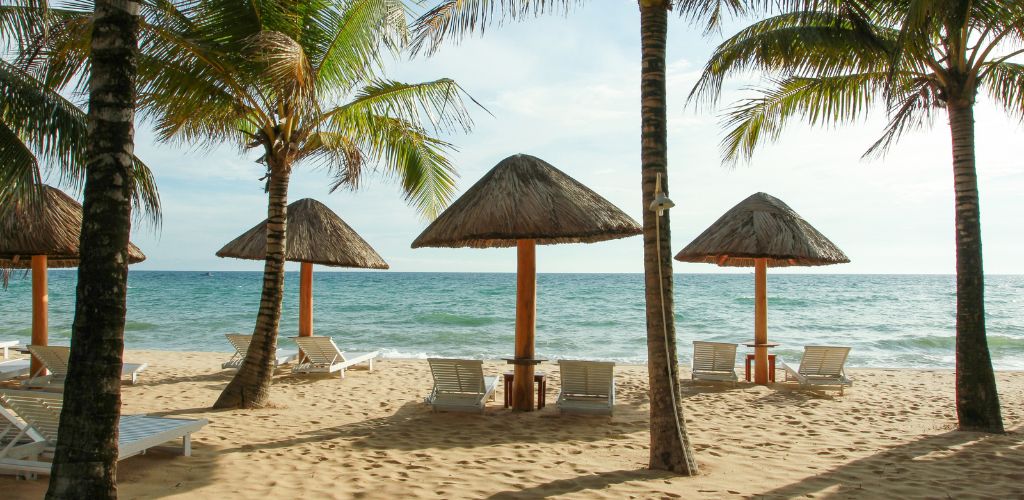
Phu Quoc is generally considered safe for travelers. The island maintains a low crime rate and violent crimes against tourists are rare. That being said, it’s always sensible to exercise basic precautions such as safeguarding valuables and being mindful of your surroundings.
The island’s continually improving and developing tourism industry ensures well-maintained beaches and resorts, and as such, I always felt comfortable and safe whilst working remotely in Phu Quoc.
In the event of any medical incidences, Phu Quoc does have facilities that can handle minor ailments and injuries. However, with the lack of modern development found in Vietnam’s bigger cities, I’d recommend seeking treatment on the mainland for any serious issues.
Best Places for Digital Nomads in Phu Quoc
There’s a variety of neighborhoods and areas for a digital nomad living in Phu Quoc to consider. Here are five of the best areas to base yourself. Each has its unique charm and amenities;
1. Duong Dong Town
The main town and commercial hub of Phu Quoc is Duong Dong. This is where you’ll find the biggest confluence of modern amenities and essential services on the island. The Dinh Cau Temple and the night market are just two popular attractions that are enjoyed by tourists and locals alike.
Situated on Phu Quoc’s central west coast, Duong Dong has great access to some fabulous beaches and many cultural attractions such as the Dinh Cau Lighthouse. It’s also a short 15-minute drive to the international airport, making it an ideal location for exploring not only Phu Quoc, but further afield too.
2. Cua Lap

If it’s more of that beach life you crave, then head south of Duong Dong and stay at Cua Lap. The beach here is sensational and picturesque ocean views are so common you’ll run the risk of taking them for granted.
It’s a popular spot for ex-pats and tourists due to the scenic surroundings and the accessibility of Duong Dong. Cua Lap has a very chilled vibe and welcoming atmosphere and yet provides enough amenities to justify calling it home.
3. Ong Lang
An even quieter and more secluded beach town is Ong Lang, around a 25-minute drive north of Duong Down. Once again, you’ll find pristine beaches, clear waters, and a tropical backdrop that looks too perfect to be real.
Being pretty close to the main center of Phu Quoc means tourists regularly make the trip to Ong Bang Beach. However, I always found it significantly less busy, even on weekends, than nearby beaches. The town has a real neighborhood feel to it with a small selection of cafes, bars, and restaurants to check out.
4. Cua Can Village
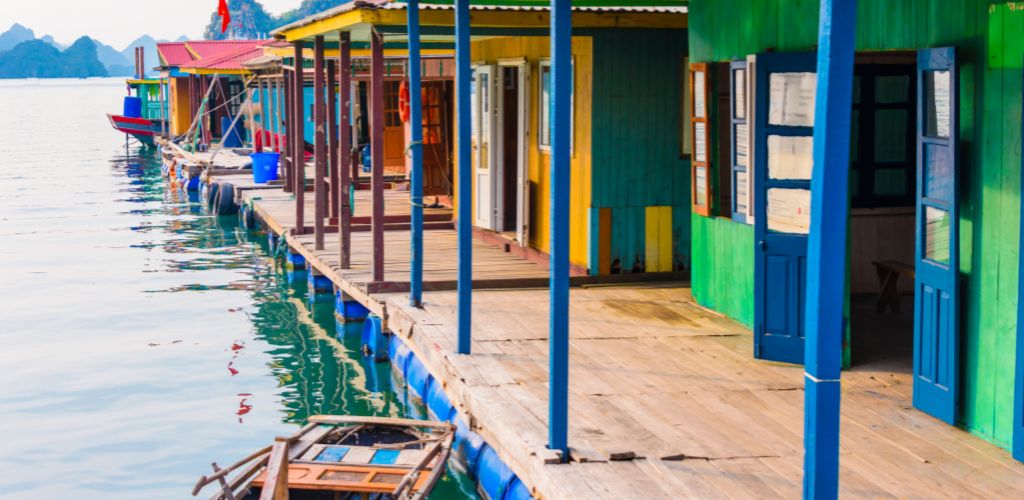
Depending on the type of experience you’re looking for in Vietnam, Cua Can Village may not be for everyone. It’s a much smaller neighborhood located towards the island’s northeast corner and situated along the Cua Can River.
I found Cua Can Village to have a charming setting with very laid-back vibes and friendly locals. Surrounded by mangrove forests and rivers, this is certainly an area for anyone who enjoys eco-friendly living and outdoor activities. Living here would appeal to digital nomads seeking a close connection to nature and a slower pace of life in Phu Quoc.
5. An Thoi
Don’t overlook the South! A 30-minute drive south of central Phu Quoc will bring you to the island’s southernmost town – An Thoi. The short and pretty straightforward journey should give you an indication of just how small the island really is.
Though it lacks some of the amenities of Duong Dong, there’s still plenty to enjoy in An Thai. A good number of restaurants, a fantastic stretch of coastline with some excellent beaches, and a more chilled social scene are just a few of the benefits of setting up camp in the south.
How to Find Accommodation in Phu Quoc

The popular tourism boom in Phu Quoc means that there are many hotels and apartments available for visitors to rent. Here are a few top places to look and some ideas to consider to ensure you get the best deals going.
1. Airbnb. The standout accommodation option for a digital nomad in Phu Quoc is Airbnb. It has many listings that feature convenient booking options, free cancellation, and affordable rates. I’ve often seen discounts of up to 40% to 50% for month-long stays.
2. Booking.com – Booking.com has an extensive array of hotel rooms and apartments for every budget in Phu Quoc, most with flexible booking options including no prepayment or free cancellation. I’d also recommend enrolling in the Genius Membership for significant discounts and additional perks on your bookings.
3. Trusted Housesitters – House sitting is an increasingly popular option for budget-friendly travel. Trusted Housesitters is my go-to website of choice – I secured a 2-week sit during my time in Phu Quoc. If you’re interested in pursuing house sitting opportunities check out my previous article, 8 Expert Tips for Landing a House Sitting Job.
4. Workaway – A great way to save money on accommodation, and often food, is to use Workaway. If you have time in your schedule to help out with community projects, teach English, or lend a hand on an eco farm, Workaway is always worth a look.
Cost of Living in Phu Quoc
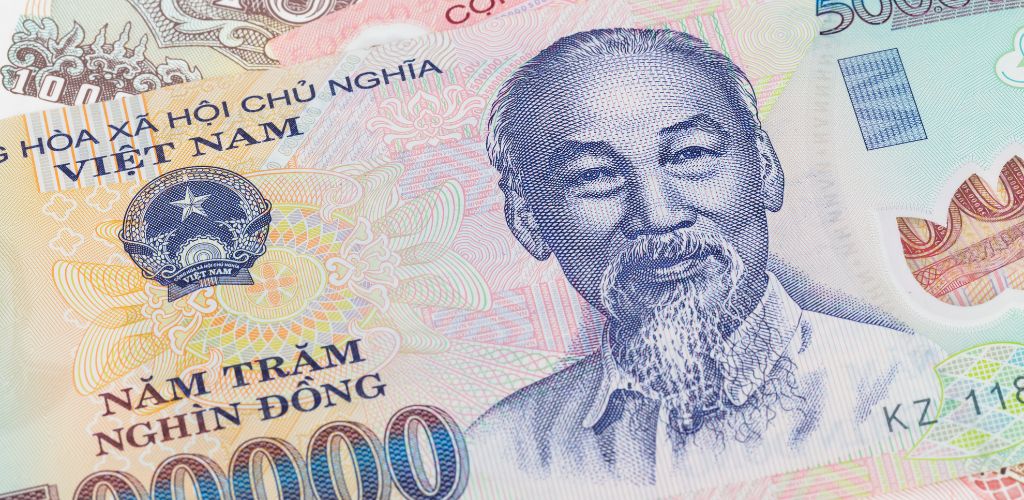
Many visitors will find Phu Quoc a very affordable place to live. There are no data-led websites to highlight much of this, so I will offer you my own experience from being a digital nomad in Phu Quoc. For further verification, I direct you to the cost of living in Hoi An, which I found to be comparable to island life in Phu Quoc.
Restaurants and Groceries
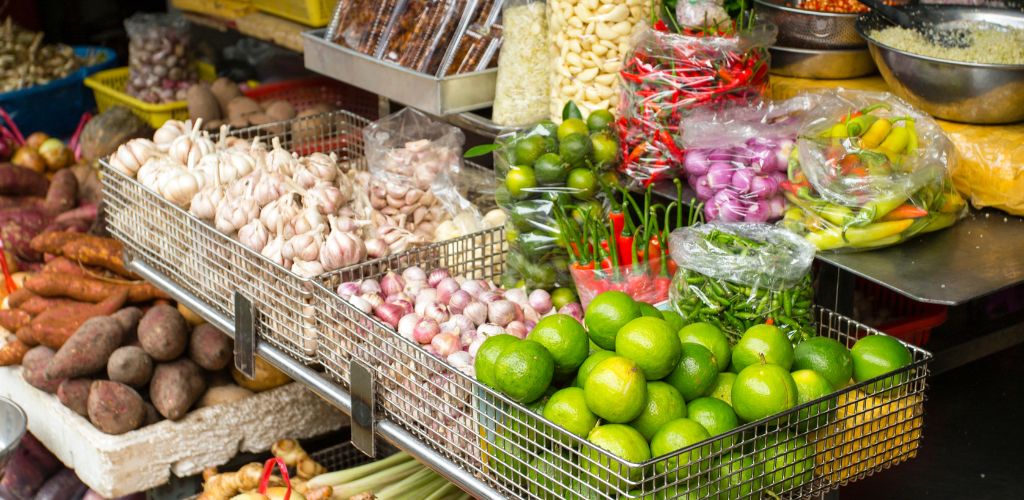
Street food stalls and traditional Vietnamese restaurants are everywhere in Phu Quoc. A decent meal can be purchased for under $1.50 and the quality is very high. You’ll notice many locals using these establishments daily – which is always a good sign!
More upmarket restaurants are of course available too, and you expect to pay around $8-$10pp for a nice 3-course meal. Going out for a coffee will cost between $1-$2 depending on how fancy you intend to be.
Grocery shopping is one particular area where I noticed a big difference from back home in the UK. Things like eggs and meat are more than 50% cheaper in Phu Quoc, as are many fruits and vegetables.
Accommodation Costs
Living on the beautiful island of Phu Quoc is much cheaper than you might first imagine. The average cost of a long-term rental is around $250-$300/month. With all utilities coming in at approximately $60, the savings on monthly outgoings can be quite significant.
Airbnb and short-term accommodation prices are a little steeper but still considerably more affordable than in many other countries I’ve visited. A nice apartment to yourself with a shared pool, gym, and sea views can cost as little as $500/month.
Transportation Costs in Phu Quoc

It’s pretty easy to get around Phu Quoc as the island isn’t too big. Reliable buses connect all the main towns with tickets costing around $0.25 for a single trip.
Grab is a useful app to set up on your phone before you arrive. The Vietnam equivalent to Uber provides a safe and secure way to book a taxi without the need for cash or communication with a non-English speaking driver. Short journeys cost under $1 and drivers in Phu Quoc won’t scoff at driving longer distances with fees around the $6-$10 mark for lengthy trips.
SIM Cards and Data
Several telecom giants in Vietnam offer SIM cards for tourists, but the big three are Mobiphone, Vinaphone, and Viettel. Whenever I’ve seen a price online, it’s differed from the price or deal I’ve ended up getting in-store, but it’s still so cheap that it doesn’t make much of a difference.
The first SIM I purchased was with Vinaphone for 1 month which costs $6 for 6GB of data a day! The second SIM was with Viettel also for 1 month and cost $8 (including a $2 fee for purchasing a new SIM card).
So, if you safely budget around $7-$10/month, you’ll easily find a SIM with ample data. The staff in the phone stores in Phu Quoc are always helpful and very familiar with setting up tourists with new SIM cards there and then.
Money Saving Tips for Phu Quoc
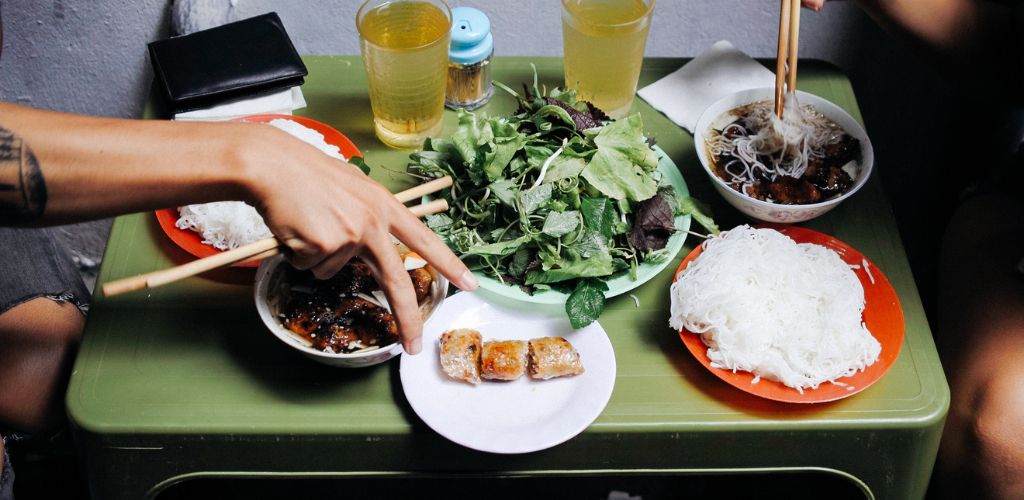
- Shop at the markets: The numerous daily and nighttime markets in Phu Quoc are great places for picking up everything from clothes to groceries.
- Haggle: Remember the Vietnamese famously enjoy haggling, especially in the marketplace.
- Get Grab Unlimited: The Grab app usually has a free trial of its membership program, offering flexible cancellation and even bigger discounts on rides and food deliveries.
- Sign up for house sitting: Save on all your accommodation costs by signing up to a site like Trusted Housesitters.
- Eat Local: There are so many great street food stalls and traditional Vietnamese restaurants in Phu Quoc where it’s possible to pick up decent meals for under $1.50.
- Enjoy Nature: Phu Quoc’s natural beauty spots, stunning beaches, and lush landscapes are free for everyone to enjoy.
- Drink Local Coffee: Ca Phe Den is a super strong Vietnamese espresso, I add hot water to it to make a delicious Americano-style drink. Best of all you’ll find it everywhere for about $0.50.
- Look for Accommodation Discounts: Many Airbnb hosts offer big discounts on longer stays. I’ve seen reductions of 40%-50% when booking for a month.
- Use Public Transport: A trip on the bus costs less than $0.25 and there are routes connecting the whole island.
Coworking Spaces and Laptop-Friendly cafes

As a digital nomad living in Phu Quoc, having access to suitable infrastructure is vital. While WiFi is available almost everywhere in Vietnam, coworking spaces in Phu Quoc aren’t as common as they are in the bigger cities of Hanoi or Ho Chi Minh City.
Having said that, it’s still possible to find all the amenities needed for remote work. Here are a few of my top places for digital nomads to base themselves in Phu Quoc;
Nora’s Cafe and Restaurant – A wonderful, calm, and spacious setting with strong coffee and even stronger WiFi. Located a short distance outside of Duong Dong it’s worth making the short journey south for the peaceful location and excellent food options.
Highlands Coffee – As the biggest chain of coffee shops in Vietnam, Highlands Coffee is always a great remote working location. WiFi is free to all customers and you’re much more likely to find more specialty coffee options here than in one of the smaller street cafes.
There’s a Highlands Coffee based in the main hub of Duong Dong a street or so away from the river, making it a vibrant and popular spot perfect for digital nomads who enjoy a lively atmosphere whilst working.
Like Coffee – If it’s a more tranquil setting amongst Phu Quoc’s natural beauty you want for your day of remote working, situate yourself at Like Coffee. Based on the edge of a small park in Duong Dong, the cafe/restaurant with a large exterior patio feels very far removed from the office.
The food options here are great, the WiFi is strong even outside, and the staff are always very happy to see you.
Shop 3S Hoa Mai – One of the only places in Phu Quoc that advertises itself as a coworking space is Shop 3S. And while they do have a few desks more suited to an office environment, it’s more of a cafe that’s hoping to attract a digital nomad crowd.
Based towards the northwestern tip of the island, this is another excellent cafe that’s welcoming of remote workers who wish to spend the day using the free WiFi, topping up their coffee cups, and working their way through the food options.
Printing Facilities – While coffee shops are a great option for free WiFi and a comfortable space to work, they often lack some of the amenities digital nomads occasionally require. Fear not, as scattered across the island are around 18-20 independent setups with printing and scanning capabilities.
Now, reliable online information on such stores is pretty slim as they are often small-run operations that are open whenever the owner is there. However, I was in urgent need of some printing and scanning whilst in Phu Quoc and managed it quickly and easily. It cost me around $2 for over 50 printed and scanned pages.
Activities and Things To Do in Phu Quoc
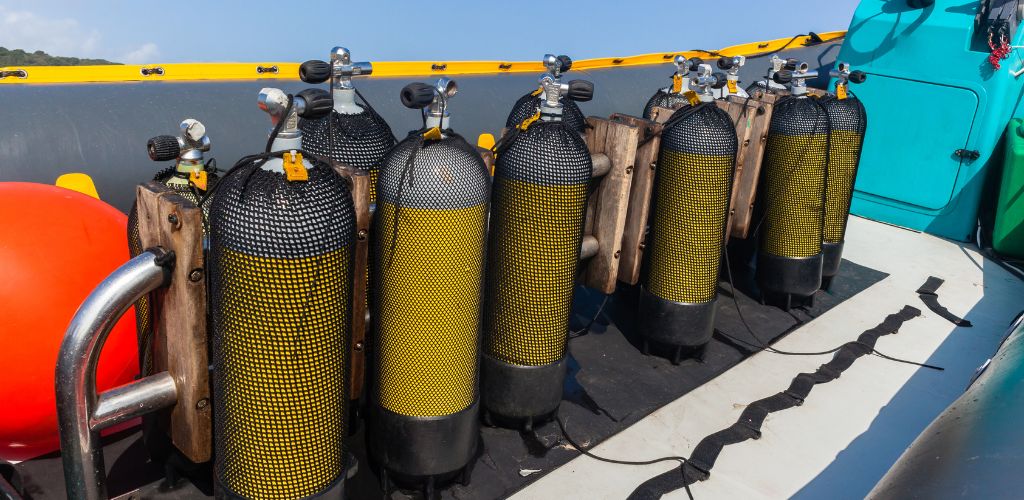
We didn’t become digital nomads just to sit and work now did we? Phu Quoc is one of the best destinations in the world for some awesome post-work activities.
1. Speedboat Island Tour, Snorkeling and BBQ
I mentioned earlier that Phu Quoc is made up of 22 islands, but what I didn’t mention is that the entire area is a hub for snorkeling and scuba diving. The turquoise waters are home to a fantastic and protected coral reef.
I wanted to explore a few of these islands so opted to do so by speedboat – why not? All the snorkeling gear was provided, and a great lunch and even a beer for good measure were thrown in. If you want to explore and quite literally dip your toe in the waters then take a look at this excellent full-day tour.
2. Eat and Drink Like a Local

There are a ton of excellent street food options available in Phu Quoc, so you’ll often be spoiled for choice. However, knowing where to go and what to eat when the menus aren’t in English can be a little daunting at the best of times.
During the first few days in Phu Quoc, I took a street food tour and got to know some local delicacies, what I should be paying for them, and where the best places to buy local dishes were located. It’s a great introduction to the street food scene, click here for more information.
3. Visit the Biggest Theme Park in Vietnam
It’s only a small island but Phu Quoc is home to the largest theme park in Vietnam. VinWonders is home to an array of attractions and thrilling rides that make for an exciting day out. Rollercoasters and epic water slides feature alongside a 4D cinema and family-friendly playgrounds and carousels. Click here to skip the lines and book your tickets now.
4. Experience the World’s Longest Cable Car Ride

Phu Quoc is also the location of the longest sea-crossing 3-wire cable car in the world. It has a length of nearly 5 miles and can carry 3500 people an hour. It takes in unrivaled, breathtaking views of the ocean and the stunning green landscapes of the island.
There are numerous tours available, but I highly recommend one that also includes a visit to a few of the other islands and a beach for a buffet lunch. Click here to read more and book your trip.
5. Go Scuba Diving
Upgrade your snorkeling experience and go scuba diving in the beautiful waters of Phu Quoc. A certified instructor is always with you and there are sessions suitable for all levels of experience. If you’ve always fancied giving scuba diving a try, now is your chance!
I found this great tour that includes pick-up and lunch, click here to learn more.
Weather in Phu Quoc

Phu Quoc has a tropical monsoon climate, characterized by distinct wet and dry seasons. The dry season typically spans from December to March. During these months, gentle sea breezes provide relief from the heat which can reach as high as 34°C (93°F).
Around April/May time, the weather transitions into the wet season, which lasts until November. Despite the occasional very heavy downpour, temperatures remain mild, although humidity levels rise and create a more tropical environment.
Overall, Phu Quoc’s weather is very appealing to people like me who dislike the cold. When the rainy season starts it can cause issues with trips, tours, and events, but for the most part, life carries on as normal on the island. Even during the wettest months, there are still over 135 hours of sunshine to enjoy the beaches.
Pros and Cons of Living in Phu Quoc
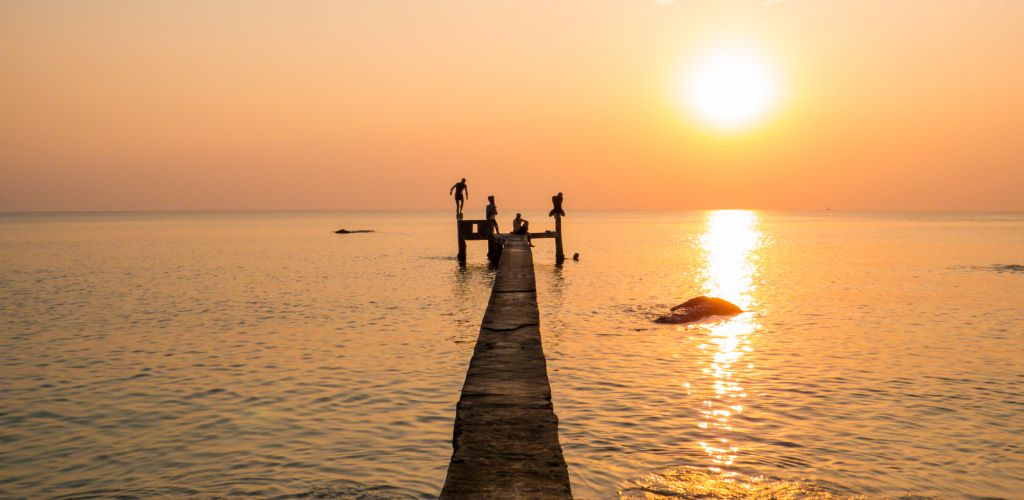
There are undoubtedly lots of pros to living on a beautiful island like Phu Quoc, but there are also some cons to be aware of too. Here are a few of my top points for digital nomads to consider.
Pros of Living in Phu Quoc
- Stunning Environment: Natural beauty is everywhere in Phu Quoc. From the pristine beaches, tranquil waters, and lush forests, it encapsulates the image of a paradise island.
- Affordable: Like much of Vietnam prices for visitors are very low. It is possible to enjoy the good life at a fraction of the cost compared to many other countries.
- Quality of Life: Although Phu Quoc has some sizeable towns, the pace of life is much slower and the overbearing stresses of city living are miles away back on the mainland.
- Onward travel: Phu Quoc International Airport is easily accessed from anywhere on the island and has daily connections with all of Vietnam and various countries around the world.
- Visa: All foreign nationals are entitled to a visa-free 30-day stay in Phu Quoc. For nationals from places like America and Canada, this means no fees for a tourist visa.
- Good WiFi: Despite being an island away from the mainland, internet connections are generally very good in Phu Quoc, allowing digital nomads to work without concern.
Cons of Living in Phu Quoc
- No Coworking Spaces: There are no dedicated coworking spaces in Phu Quoc. Remote working options will come in the form of laptop-friendly cafes or services provided by a hotel/accommodation.
- Rainy Season: Between May and November Phu Quoc experiences a rainy season. This can mean some seriously heavy downpours and disruptions to daily life.
- Tourist Crowds: Phu Quoc is a popular destination for tourists from around the world and as such can be very busy during peak seasons and vacation times.
- Limited Infrastructure: Although Phu Quoc does have medical facilities and general infrastructure it lacks the advanced development of Vietnam’s bigger cities.
Digital Nomad Visa for Phu Quoc
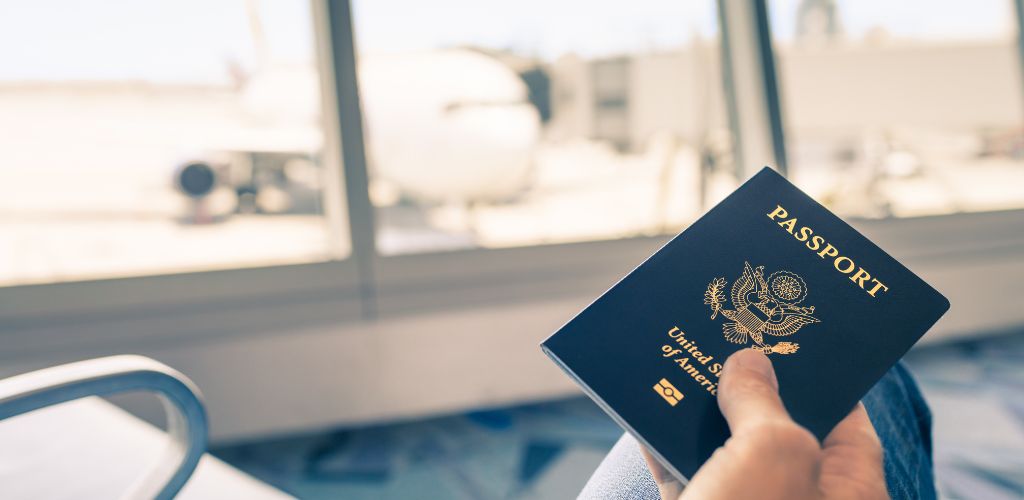
There aren’t currently any specific visas for digital nomads in Phu Quoc. However, all foreign nationals are allowed a 30-day stay without the need for a tourist visa. It’s important to note that while Phu Quoc provides this visa-free stay, broader regulations apply to other regions in Vietnam.
For instance, citizens of the UK and 12 other countries can stay for up to 45 days in Vietnam without a visa, with an option to extend their stay to 90 days through an online application or at a designated entry point.
Visitors from the USA and Canada must obtain a tourist visa, which can be secured online before travel or upon arrival at international entry points. The duration of these visas ranges from 1 to 3 months, with associated costs varying between $25 and $50, depending on the intended length of stay and the number of entries needed.
In Conclusion
I hope my digital nomad guide to Phu Quoc has whet your appetite for a slice of island living. My time there was the epitome of what I hoped to experience when setting out as a digital nomad – laptop and coffee all morning followed by chilling on the beach or hiking in the tropical forests in the afternoon.
Although it may lack the conventional coworking spaces, there are still plenty of outstanding locations from which to base yourself. Furthermore, on such an accessible island, everything is at your disposal. Enjoy!
[ad_2]
Source link

